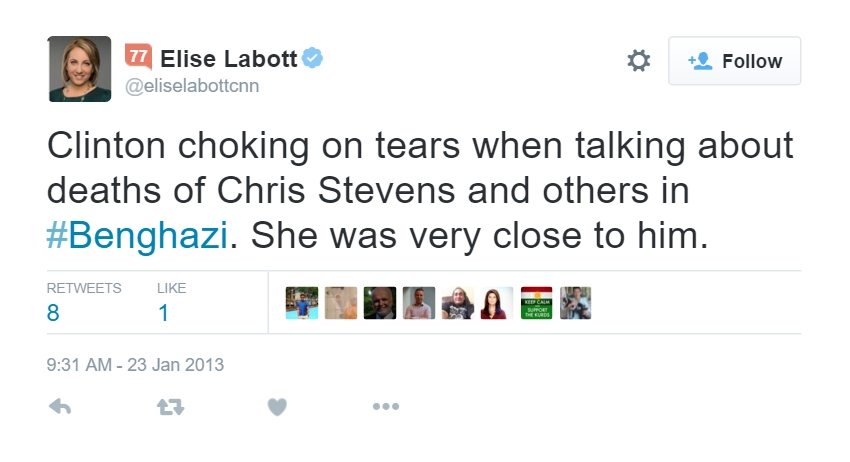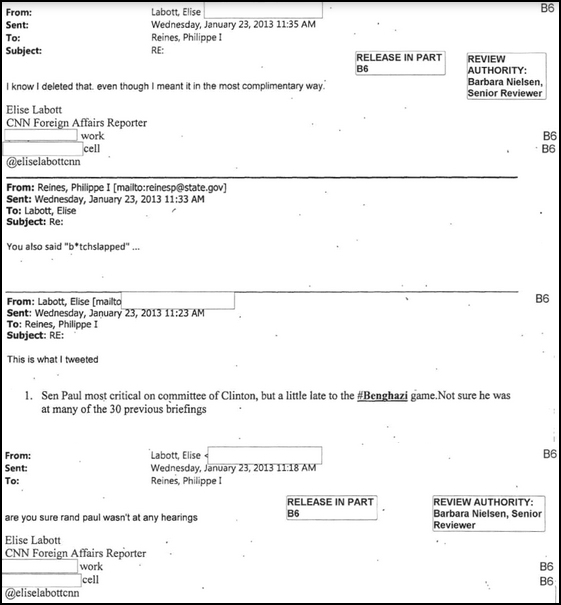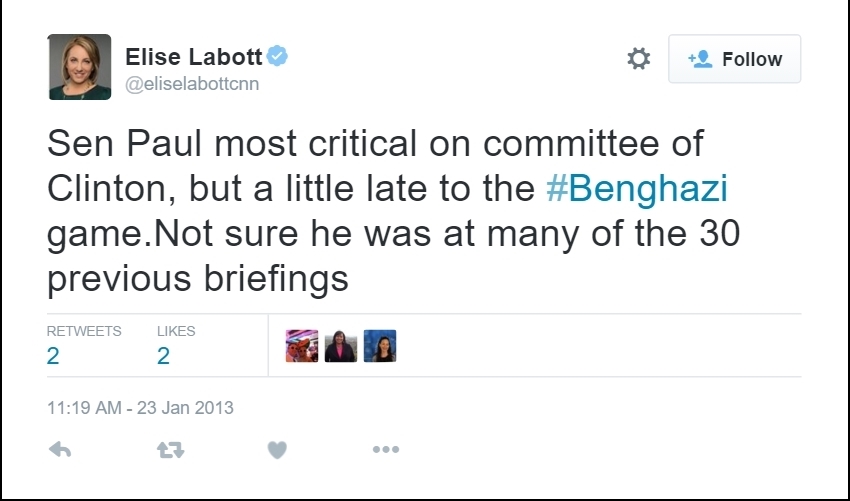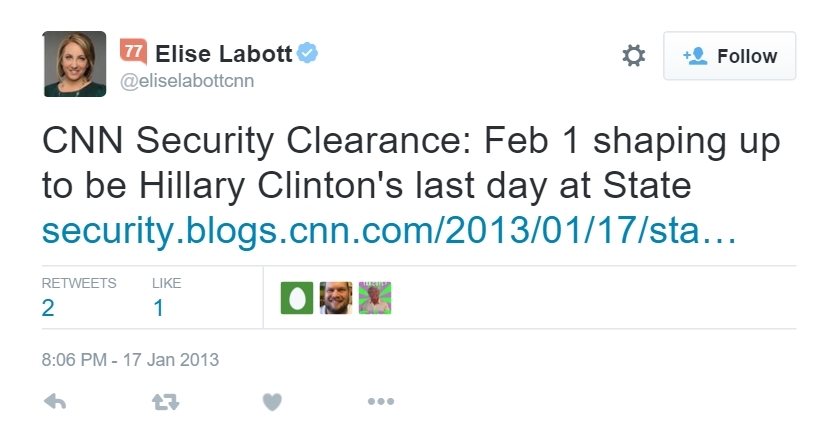A CNN reporter appears to have coordinated her coverage of a 2013 congressional hearing on Benghazi with Hillary Clinton’s former State Department spokesman, but some in the press maintain she was simply working a source.
CNN global affairs correspondent Elise Labott was in regular contact with Hillary Clinton’s then-personal spokesman and aide, Philippe Reines, on Jan. 23, 2013, when the former secretary of state testified before Congress on her role in the events surrounding the deadly Sept. 11, 2012, terrorist attacks on U.S. facilities in Benghazi, Libya.
The revelation that Labott apparently coordinated her coverage with Reines comes from a batch of newly released State Department emails, which were published Monday by Gawker after the New York-based news group obtained them through a Freedom of Information Act request.

Those defending Labott from charges of being used as a mouthpiece by a government official assert that there’s nothing unethical about the unearthed communications. The Reines emails, they explain, reveal only that reporters are constantly wooing their sources, which is standard for the industry.
“I’m truly disheartened by the rush to punish talented reporters. Nothing untoward has happened here,” said the Washington Free Beacon’s Adam Kredo said Tuesday on social media. “This is a Shonda. [Elise Labott] is as neutral as they come. And a talented reporter.”
“If you think she is taking marching orders you’re nuts,” he told the Washington Examiner’s media desk. “And if you don’t think reporters work sources, you’re not in the biz.”
BuzzFeed’s Andrew Kaczynski echoed these sentiments, suggesting that Labott’s January 2013 conversation with Reines is fairly commonplace in an industry where one party is constantly trying to gain access and information.
“This exchange seems like normal source [conversation] to be honest,” he told the Examiner’s, referring to the State emails. “[I] feel like people would be pretty surprised at stuff operatives and reporters from both parties say to each other.”
Labott sent Reines an email on the morning of Jan. 23, 2013, to double-check whether Sen. Rand Paul, R-Ky., had missed previous Benghazi hearings. She apparently got that claim from Reines himself.
“Are you sure Rand Paul wasn’t at any hearings?” she asked.
Shortly after checking in with Reines, Labott tweeted, “Sen Paul most critical on committee of Clinton, but a little late to the #Benghazi game. Not sure he was at many of the 30 previous briefings.”
She followed up with a second email, letting Reines know that she had noted the Kentucky senator’s supposed absences.

Their communications included emails and texts via Blackberry. Each Blackberry is assigned a unique a Personal Identification Number, and Blackberry users can use these to send each other secure messages. Clinton’s personal adviser and Labott communicated PIN-to-PIN that Wednesday afternoon as the former secretary of state answered questions from members of Congress, State Department emails show.
“I suggested a good tweet,” Reines said in an email.
“What did you suggest,” she responded. “I didn’t see it.”
Reines responded by directing her to her PIN messages.
Shortly after their email communication, Labott tweeted, “Clinton: I tried to be transparent. I could have joined the 18 [Accountability Review Boards], kept it classified and then said goodbye. That is not who I am.”

Finally, on Wednesday evening, Reines sent Labott an email reading, “Excellent. Nice doing business with you.”
He then had more advice for Labott: “You should tweet something like ‘Feb. 1st looking like Hillary’s last day’ and link to the story. That will drive your colleagues nuts.”
The CNN reporter tweeted later that evening, “CNN Security Clearance: Feb 1 shaping up to be Hillary Clinton’s last day at State.”

Earlier that same month, Labott seemingly admitted in an email to Reines that she purposely mislead other networks on behalf of Clinton’s State Department team.
“I did get several emails from networks today asking if I thought the reason there was no on-[camera] was because you guys were trying to hide something. I just answered that it was customary in the week of new years (even though that’s not entirely true) but frankly nobody believes me,” she said in an email dated Jan. 02, 2013.
“So there shouldn’t be a big deal about an on camera briefing right? You know better than anyone that optics matter. I’m just saying,” she added.
Labott is not alone in coordinating with Reines to offer a member of the Clinton family seemingly favorable “optics.”
A separate batch of State Department emails released by Gawker also showed that Politico’s chief White House correspondent, Mike Allen, tried in 2013 to leverage access to the former first family by offering to give Chelsea Clinton a “no-surprise,” “no risk” softball interview.
Like Labott’s many correspondences with Reines, there’s nothing shocking about what Allen offered Reines, certain media colleagues argued.
“People hate media and will assume the worst. Most of this stuff is just everyday tradecraft — same BS as any job,” Politico’s Glenn Thrush said on Twitter. “Lying to flacks for access upfront is a venerated tradition.”
“I lie constantly to flacks — speaking for myself — like being a cop: [the Supreme Court of the United States] says they can lie to elicit confession,” he added later, responding to the Examiner’s media desk suggesting that implying Allen had lied to Reines was probably not doing the White House correspondent any favors.
Labott is currently serving a two-week suspension from CNN after voicing an opinion on Congress’ bill last week to halt the flow of Syrian refugees into the United States.
Neither Labott nor spokespersons for CNN responded to the Examiner’s repeated requests for comment.
(h/t Phil Kerpen)
